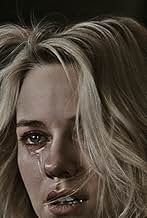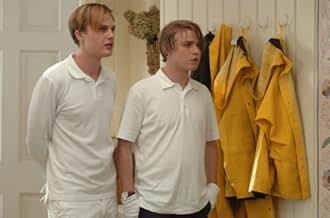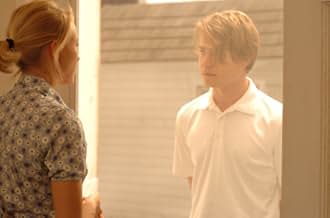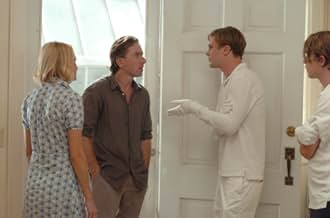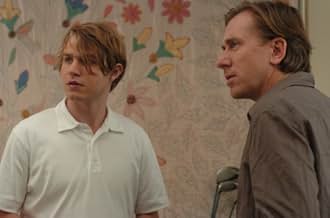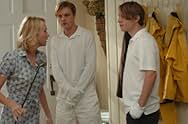Zwei psychopathische junge Männer nehmen eine Familie in ihrem eigenen Ferienhaus als Geiseln.Zwei psychopathische junge Männer nehmen eine Familie in ihrem eigenen Ferienhaus als Geiseln.Zwei psychopathische junge Männer nehmen eine Familie in ihrem eigenen Ferienhaus als Geiseln.
- Auszeichnungen
- 1 Gewinn & 6 Nominierungen insgesamt
Empfohlene Bewertungen
I haven't seen Haneke's 1997 version of this film otherwise I sure would have avoided this one since, as has been said, it's a scene by scene copy. Basically, 'Funny Games U.S.' is pointless trash. I noticed many people liked it because it was different from the usual Hollywood flick. Well I'd advise them to look beyond Hollywood and they'll find plenty of movies that are different and GOOD. Why opt for something crappy just because you want something else? Others seem to find layers in the film that to me were non-existent. 'Funny Games U.S.' is pretentious garbage and the ONLY good things about it are Naomi Watts and child actor Devon Gearhart. Both deliver very natural performances and are the only people you care about on screen. Watts's name was the main thing that convinced me to watch this. Incredibly gifted actress that she is, I liked every single one of her films that I saw until now. What made her choose this film? Anyway, 'Funny Games U.S.' is a pure waste of time.
Watching "Funny Games" is a bit like coming across a major accident on the highway - you know you should continue driving on past the scene, but you just can't keep yourself from slowing down and gawking at all the wreckage.
The premise of the story does not sound very promising at first, as the idea, or a simple variation of it, has served as the foundation for countless such films in the past: an innocent family of three is held hostage in their home by a couple of sadistic killers who systematically abuse and terrorize their victims for their own twisted pleasure.
So many horror movies are predictable and formulaic that it's a pleasant surprise to come across one that actually makes an effort to break free of its bonds and make its own way in the world. And, indeed, "Funny Games" busts through the horror movie conventions with an almost ruthless determination. In this Americanized version of a film he made in his native Austria in 1997, director Michael Haneke scrupulously avoids obvious camera setups and editing techniques, bypassing virtually every storytelling, visual or audio cliché endemic to the genre. There is no background music, for instance, to cue us into the scary moments, no screeching cats jumping out of the shadows, and no point-of-view shots designed to generate easy suspense. Unlike in most films of this type, the violence here happens in an entirely haphazard and random manner, making it all the more frightening in its unpredictability and plausibility. Haneke refuses to cater to the expectations of his audience, making them face the reality of the nightmare he's showing them rather than giving them what it is they may want to see.
Michael Pitt and Brady Corbet are cringe-worthy and terminally creepy as the smarmy psychopaths who get their jollies out of watching other people suffer, while Naomi Watts, Tim Roth and Devon Gearhart engage our full sympathy as the hapless victims who have come up against the blank wall of two twisted minds they are woefully unequipped to even understand, let alone wage battle against.
This is one of the most memorable and artful horror films of recent times, but it is also one of the most unnerving and difficult to watch. The movie gets into your bones, no matter how much your better angels may be telling you to keep it out. It's depressing and disturbing and is certainly not intended for all audiences, but it is a movie that it is very difficult to shake off once you've given yourself over to it.
The premise of the story does not sound very promising at first, as the idea, or a simple variation of it, has served as the foundation for countless such films in the past: an innocent family of three is held hostage in their home by a couple of sadistic killers who systematically abuse and terrorize their victims for their own twisted pleasure.
So many horror movies are predictable and formulaic that it's a pleasant surprise to come across one that actually makes an effort to break free of its bonds and make its own way in the world. And, indeed, "Funny Games" busts through the horror movie conventions with an almost ruthless determination. In this Americanized version of a film he made in his native Austria in 1997, director Michael Haneke scrupulously avoids obvious camera setups and editing techniques, bypassing virtually every storytelling, visual or audio cliché endemic to the genre. There is no background music, for instance, to cue us into the scary moments, no screeching cats jumping out of the shadows, and no point-of-view shots designed to generate easy suspense. Unlike in most films of this type, the violence here happens in an entirely haphazard and random manner, making it all the more frightening in its unpredictability and plausibility. Haneke refuses to cater to the expectations of his audience, making them face the reality of the nightmare he's showing them rather than giving them what it is they may want to see.
Michael Pitt and Brady Corbet are cringe-worthy and terminally creepy as the smarmy psychopaths who get their jollies out of watching other people suffer, while Naomi Watts, Tim Roth and Devon Gearhart engage our full sympathy as the hapless victims who have come up against the blank wall of two twisted minds they are woefully unequipped to even understand, let alone wage battle against.
This is one of the most memorable and artful horror films of recent times, but it is also one of the most unnerving and difficult to watch. The movie gets into your bones, no matter how much your better angels may be telling you to keep it out. It's depressing and disturbing and is certainly not intended for all audiences, but it is a movie that it is very difficult to shake off once you've given yourself over to it.
When I heard Michael Haneke was re-making Funny Games in America I wondered why: what purpose could it possibly serve? The set-up to both versions is simple in that a bourgeois family is subjected to a torturous ordeal by a couple of ever so polite psychopaths. Moreover, like the original the re-make is a cruel exercise in exposing our fascination with the violence depicted in the media - the "our" specifically meaning the middle classes, comfortable in our existences and oblivious to the horrors of the world.
However, Haneke is on record as saying that he always considered Funny Games to be an "American story", as he regarded the use of violence as a form of entertainment to be a specifically American phenomenon. No matter that this is a bit of a flawed viewpoint: having the aggressors seem straight out of the O.C. gives the impact of their sadistic actions an even more discomfiting air. Michael Pitt (charismatic and barbarous) and Brady Corbett (seemingly dopey but utterly vicious) are both excellent, but their performances leave one feeling a bit um "seen it all before".
Which takes me back to my first thought: what is the point? Cosmetics aside this is exactly the same film, right down to the assumption that the well to do like to listen to classical music and that the audience may be unsettled by playing them some thrash metal. Haneke even has Pitt address the camera and manipulate the film, so re-using the trick about playing with reality and focusing the viewer on what actually counts as real. It is just that this playing around does not carry the impact it did 10 years ago.
In fact, due to the unconventional nature of the film and the vast disparity it offers with reality it's hard to care much at all. Yes what happens is horrible, but it does not feel at all real. I'm waiting for someone to point out that, that is Haneke's point, but frankly, I don't care. No amount of intellectualising can make this watchable.
You would think Haneke would know better too. His most recent film Hidden took a genre film and flipped it about to deliver one of the most surprising and intellectually challenging thrillers of the decade. By stringing the audience along and offering some sense of catharsis and understanding of character motivation he offered a way in. Funny Games U.S. offers no such intrigue or tension and is ultimately a big step backward. He may see it as an American story, but it worked better as a small Austrian film, set in anywheres-ville Europe.
However, Haneke is on record as saying that he always considered Funny Games to be an "American story", as he regarded the use of violence as a form of entertainment to be a specifically American phenomenon. No matter that this is a bit of a flawed viewpoint: having the aggressors seem straight out of the O.C. gives the impact of their sadistic actions an even more discomfiting air. Michael Pitt (charismatic and barbarous) and Brady Corbett (seemingly dopey but utterly vicious) are both excellent, but their performances leave one feeling a bit um "seen it all before".
Which takes me back to my first thought: what is the point? Cosmetics aside this is exactly the same film, right down to the assumption that the well to do like to listen to classical music and that the audience may be unsettled by playing them some thrash metal. Haneke even has Pitt address the camera and manipulate the film, so re-using the trick about playing with reality and focusing the viewer on what actually counts as real. It is just that this playing around does not carry the impact it did 10 years ago.
In fact, due to the unconventional nature of the film and the vast disparity it offers with reality it's hard to care much at all. Yes what happens is horrible, but it does not feel at all real. I'm waiting for someone to point out that, that is Haneke's point, but frankly, I don't care. No amount of intellectualising can make this watchable.
You would think Haneke would know better too. His most recent film Hidden took a genre film and flipped it about to deliver one of the most surprising and intellectually challenging thrillers of the decade. By stringing the audience along and offering some sense of catharsis and understanding of character motivation he offered a way in. Funny Games U.S. offers no such intrigue or tension and is ultimately a big step backward. He may see it as an American story, but it worked better as a small Austrian film, set in anywheres-ville Europe.
I first watched Funny Games (US) and enjoyed it (well, thought it was a film I'd like to watch again), so I bought it. However, half way through a second viewing, I decided I couldn't take any more and turned it off.
Some may say that's a sure sign that it's a bad movie. They may be right - even its star Tim Roth has since refused to watch it. The film is actually an American version (filmed shot for shot) of an Austrian 'home invasion' movie and is supposed to be about 'the nature of violence.' I didn't know this when I first watched it and just looked at it as a horrific film which was deliberately quirky.
It's about a family who get held hostage in their own (holiday) home by two nasty - yet annoyingly polite - young psychopaths. The first time I watched it I stuck with it and thought it was interesting/different enough to warrant a second viewing. I guess the reason I turned it off is because it was just too frustrating to watch. I practically wanted to jump into the TV armed with a chainsaw and... well, I won't give too much away.
If you don't know about the film, I won't spoil the 'weirder' bits. It's definitely not a horror film, as there isn't much blood and gore (what there is happens off screen). It's more an experience in frustration making statements about the audience's desire to witness blood and gore on the big screen. Now, some may say that's a bit pretentious and, if you feel this way, this film probably isn't for you.
If you want to watch this - be prepared for the least 'feel good' film ever made. It's not a horror and it's not a thriller. It's simply an exercise in watching. It's different enough to rise above a lot of its fellow genre films, but may not be everyone's cup of tea and is definitely hard to sit through.
Some may say that's a sure sign that it's a bad movie. They may be right - even its star Tim Roth has since refused to watch it. The film is actually an American version (filmed shot for shot) of an Austrian 'home invasion' movie and is supposed to be about 'the nature of violence.' I didn't know this when I first watched it and just looked at it as a horrific film which was deliberately quirky.
It's about a family who get held hostage in their own (holiday) home by two nasty - yet annoyingly polite - young psychopaths. The first time I watched it I stuck with it and thought it was interesting/different enough to warrant a second viewing. I guess the reason I turned it off is because it was just too frustrating to watch. I practically wanted to jump into the TV armed with a chainsaw and... well, I won't give too much away.
If you don't know about the film, I won't spoil the 'weirder' bits. It's definitely not a horror film, as there isn't much blood and gore (what there is happens off screen). It's more an experience in frustration making statements about the audience's desire to witness blood and gore on the big screen. Now, some may say that's a bit pretentious and, if you feel this way, this film probably isn't for you.
If you want to watch this - be prepared for the least 'feel good' film ever made. It's not a horror and it's not a thriller. It's simply an exercise in watching. It's different enough to rise above a lot of its fellow genre films, but may not be everyone's cup of tea and is definitely hard to sit through.
This is probably due to the fact that I just watched the original yesterday but it was almost distracting how similar this was. Like the 1997 version, this movie felt very authentic but to me it didn't leave the same impact.
I definitely prefer Arno Frisch as Paul. Not that this version is significantly worse or anything, he just doesn't stick out to me as much as he did in the original.
All in all, my only take away from this is that it's an english remake of Funny Games. If that's all it was trying to do, i'd say it did it well. Might have to rewatch this when the original film isn't as fresh in my head.
I laughed out loud when Fred's mom showed up.
I definitely prefer Arno Frisch as Paul. Not that this version is significantly worse or anything, he just doesn't stick out to me as much as he did in the original.
All in all, my only take away from this is that it's an english remake of Funny Games. If that's all it was trying to do, i'd say it did it well. Might have to rewatch this when the original film isn't as fresh in my head.
I laughed out loud when Fred's mom showed up.
Wusstest du schon
- WissenswertesTim Roth has said making this film traumatized him, and he'll never watch it. He said he was particularly disturbed because Devon Gearhart resembled his own son.
- PatzerWhen Ann is talking to her friend on the phone she mentions that the kitchen clock is broken and it needs fixed. The clock is clearly visible on the shelf to her right. When Peter/Tom comes back into the kitchen for eggs, the clock is missing.
- SoundtracksCare Selve, Ombre Beate
from 'Atalanta'
Written by George Frideric Handel (as G. F. Händel)
Performed by Beniamino Gigli
(P) 1950 EMI Records, Ltd.
Digital Remastering: (P) 1999 EMI Records
Courtesy of EMI Music (France)
Top-Auswahl
Melde dich zum Bewerten an und greife auf die Watchlist für personalisierte Empfehlungen zu.
Details
- Erscheinungsdatum
- Herkunftsländer
- Sprache
- Auch bekannt als
- Juegos sádicos
- Drehorte
- Produktionsfirmen
- Weitere beteiligte Unternehmen bei IMDbPro anzeigen
Box Office
- Budget
- 15.000.000 $ (geschätzt)
- Bruttoertrag in den USA und Kanada
- 1.294.919 $
- Eröffnungswochenende in den USA und in Kanada
- 544.833 $
- 16. März 2008
- Weltweiter Bruttoertrag
- 7.948.284 $
- Laufzeit
- 1 Std. 51 Min.(111 min)
- Farbe
- Sound-Mix
- Seitenverhältnis
- 1.85 : 1
Zu dieser Seite beitragen
Bearbeitung vorschlagen oder fehlenden Inhalt hinzufügen







